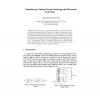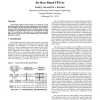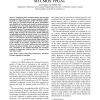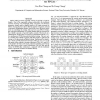27 search results - page 1 / 6 » Simultaneous Timing Driven Clustering and Placement for FPGA... |
FPL
2004
Springer
14 years 4 months ago
2004
Springer
Traditional placement algorithms for FPGAs are normally carried out on a fixed clustering solution of a circuit. The impact of clustering on wirelength and delay of the placement s...
DAC
1994
ACM
14 years 3 months ago
1994
ACM
Sequential place and route tools for FPGAs are inherently weak at addressing both wirability and timing optimizations. This is primarily due to the difficulty in predicting these ...
JCP
2008
13 years 10 months ago
2008
Rapid increase in transistor density and operating frequency has led to the increase in power densities, exhibiting itself as a high temperature profile. The high temperature spots...
FPL
2005
Springer
14 years 4 months ago
2005
Springer
Current FPGA placement algorithms estimate the routability of a placement using architecture-specific metrics. The shortcoming of using architecture-specific routability estimates ...
DAC
2000
ACM
14 years 11 months ago
2000
ACM
FPGA routing resources typically consist of segments of various lengths. Due to the segmented routing architectures, the traditional measure of wiring cost (wirelength, delay, con...




